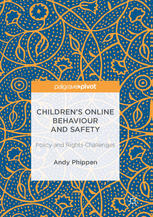

Most ebook files are in PDF format, so you can easily read them using various software such as Foxit Reader or directly on the Google Chrome browser.
Some ebook files are released by publishers in other formats such as .awz, .mobi, .epub, .fb2, etc. You may need to install specific software to read these formats on mobile/PC, such as Calibre.
Please read the tutorial at this link. https://ebooknice.com/page/post?id=faq
We offer FREE conversion to the popular formats you request; however, this may take some time. Therefore, right after payment, please email us, and we will try to provide the service as quickly as possible.
For some exceptional file formats or broken links (if any), please refrain from opening any disputes. Instead, email us first, and we will try to assist within a maximum of 6 hours.
EbookNice Team

Status:
Available4.6
13 reviewsThis book explores the use of technology in young people’s social lives against a backdrop of “online safety measures” put in place by the UK government to ensure safe and risk free engagement with online services. The UK landscape is used as a case study to compare the grass roots of digital behaviours with attempts by policy makers to control access and prohibit “bad” behaviours. In conducting an analysis of current UK policy positions and media perspectives against ethnographic research in areas such as gaming and sexting, the book highlights the flaws in approaching the control of disruptive social behaviours using prohibitive approaches. It also highlights the gulf between the experiences of young people and the capabilities of the school system to deliver effective education around safe online behaviours. The author illustrates the complex relationship young people have with technology, as active engagers rather than passive consumers, and looks at the ways in which their needs for effective education and resilience are currently not being met. Furthermore, he demonstrates how, in an effort to make them safe, stakeholders are eroding children’s fundamental rights.
Children’s Online Behaviour and Safety will be of interest to scholars, practitioners and students researching and practicing in education, sociology, children’s law, children’s digital rights and social policy.